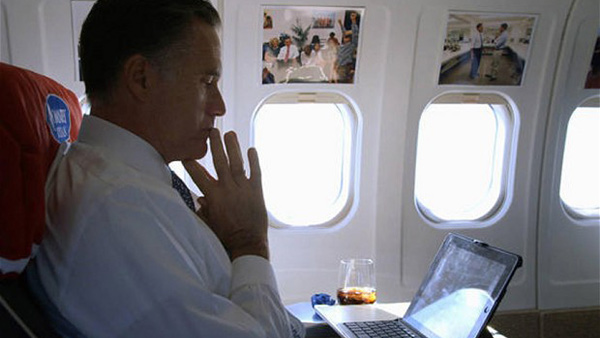Mitt Review
Posted on February 8, 2014 By John Gilpatrick 2014, Documentaries, Movie Reviews, New Releases
Though it’s chronicling years of recent Republican political history, Mitt is a mostly apolitical film, and certainly, the lessons one takes away from the film (which is available to stream on Netflix) have nothing to do with your choice of party. On a very basic level, it tries to humanize a man who so often seemed robotic during the 2012 election cycle. When viewed through that prism, Mitt is moderately (as opposed, I guess, to “severely”) successful. It’s also a tad mundane. More interesting is the way director Greg Whiteley captures something truly depressing about politics: Romney never seemed human because that’s not politics on a national level.
The film begins with a sobering question: “What do you say in a concession speech?” Romney, just seconds after learning he’s the losing presidential candidate, looks around the room at his family and closest advisors. They’re at a loss.
Jump back to 2006, and things are simpler for this large, wealthy, happy, good clan of people. Romney is playing in the snow with his grandchildren, but after they’re all tucked into their beds, the conversation becomes serious. Everyone—Mitt, wife Ann, their five sons, and their sons’s wives—goes around the room weighing the pros and cons of a Romney ’08 campaign. It’s a reasonable conversation among people who love each other, and they end up finding common ground pretty easily: a run for president would be brutal, being president would be brutal, but shouldn’t you, Mitt, at least give it a shot?
The rest, of course, you know. He does, and it goes…OK. He loses, but as he tells his family before officially conceding, at least he’s built a brand, and if he goes for it again in 2012 (which is family is adamant he doesn’t), he’ll be a known quantity.
Up to the point at which Mitt jumps four years ahead to the 2012 general election, it’s rather compelling. It’s interesting to see someone so familiar in such a new, unaffected light, and Romney’s insight into his own candidacy and his inability to successfully control his image. But in skipping the decision to run again (the family presumably didn’t want cameras following them after their run), the Republican primaries, and all the lovely little details in between, Whiteley condemns almost half his film to being little more than a Cliff’s Notes version of political events so recent there hasn’t been enough time to give them historical weight. Yes, it’s cool to see where the Romney camp’s collective head was at following his terrific first debate performance or the release of the 99% video, but it’s in these sequences that the film’s themes are least evident.
And those themes—when Whiteley lets them shine—are more than capable of carrying the film. Political documentaries are a dime a dozen, but ones that are generally spin-free and level-headed don’t come along often. Whiteley’s lack of interest in scoring political points allows him to put a face (Romney’s) on a problem rarely discussed from a politics-free perspective. Why do politicians pander? Because we want them to. Or maybe it’s because they think we want them to. Either way, it’s a problem because real people aren’t running for office. It’s hard to say if votes would have changed had people met this Mitt during his run for the presidency, but it would have been nice to have two three-dimensional individuals—not two cartoony, villainous caricatures—seeking to become the most powerful person in the world.
Mitt‘s thematic strengths help it overcome its tendencies to meander and focus too much on Romney minutiae. It could be a case of the director being too close to the material and wanting people to see the real Mitt desperately. (At one point, a Romney grandchild runs at the camera and gleefully yells, “Greg!”) I’m just not sure he realizes what the strengths of his film are. But whether he does or not, Mitt is a strong, pleasant example of fly-on-the-wall non-fiction filmmaking.
3 Stars, Ann Romney, Barack Obama, Documentary, Mitt, Mitt Romney

















One Response to Mitt Review